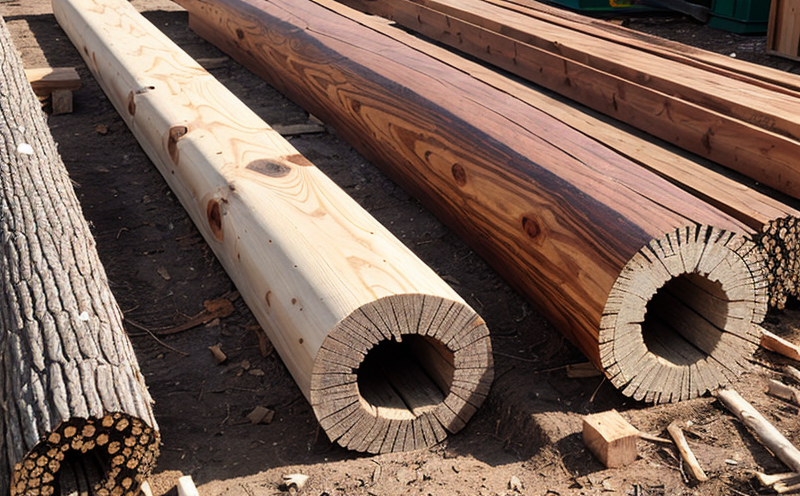Preservative Performance Testing under Marine Conditions
The importance of wood preservation cannot be overstated in sectors such as agriculture and forestry. Wood is a renewable resource widely used in construction, infrastructure projects, and agricultural equipment due to its durability and availability. However, marine environments present unique challenges that demand specialized testing to ensure the longevity and reliability of wood products.
Preservative performance testing under marine conditions evaluates the effectiveness of wood preservatives against decay organisms and environmental stressors. This type of testing is crucial for ensuring that treated wood can withstand harsh marine environments where moisture, saltwater, and microorganisms pose significant threats. The goal is to determine if the applied preservatives provide sufficient protection, thereby extending the service life of wooden structures.
The testing process involves several key steps. Specimens are prepared according to industry standards such as ISO 11402 or ASTM D1413. These specimens are then exposed to simulated marine environments that replicate conditions found in coastal areas and open waters. The exposure duration varies depending on the specific requirements but can last for up to one year.
During this period, detailed observations are made regarding changes in the appearance of the wood, such as color alterations or surface decay. Microbiological analyses may also be conducted to assess the presence and growth rates of decay organisms like fungi and bacteria. Additionally, physical properties such as dimensional stability, mechanical strength, and resistance to deformation are measured before and after exposure.
The results from these tests provide critical insights into the performance of different preservatives under marine conditions. This information is invaluable for quality managers in agriculture and forestry who need to ensure compliance with regulatory standards and maintain high product quality. Compliance officers can use this data to verify that their suppliers meet required specifications, while R&D engineers leverage it to innovate more effective preservation techniques.
Wood preservation testing under marine conditions aligns closely with international standards such as ISO 11402-1 through -5, which specify methods for evaluating the durability of wood treated with preservatives. These standards provide a robust framework that ensures consistent and reliable testing across various applications.
Why It Matters
The performance of wood in marine environments is critical given its extensive use in coastal and offshore structures, as well as agricultural equipment subjected to saltwater exposure. Failure to properly preserve wood can lead to premature degradation, increased maintenance costs, and potential safety hazards. By conducting preservative performance testing under marine conditions, stakeholders can make informed decisions that enhance the reliability and longevity of wooden components.
For quality managers, this testing ensures consistency in product quality by identifying any shortcomings in preservation methods early on. Compliance officers rely on these tests to confirm adherence to regulatory requirements, ensuring that products meet or exceed industry standards. R&D engineers benefit from such data as it guides them towards developing better preservatives and treatment processes.
Moreover, the results of marine testing can influence procurement strategies by helping companies select suppliers who deliver high-quality, long-lasting wood products. In agricultural contexts, this translates to more durable infrastructure that withstands harsh weather conditions, thereby supporting sustainable practices in food production.
Applied Standards
The preservative performance testing under marine conditions adheres to a variety of international standards designed to ensure accuracy and reliability. ISO 11402-1 through -5 are particularly relevant as they provide comprehensive guidelines for evaluating the durability of wood treated with preservatives.
- ISO 11402-1: General requirements, sampling, and preparation of specimens.
- ISO 11402-2: Salt spray exposure tests.
- ISO 11402-3: Freshwater immersion tests.
- ISO 11402-4: Marine immersion tests.
- ISO 11402-5: Drying tests and associated procedures.
These standards are regularly updated to reflect advances in preservation technology and environmental factors. Compliance with these standards not only enhances the credibility of test results but also fosters a global consensus on best practices for wood preservation.
In addition to ISO standards, other recognized bodies such as ASTM (American Society for Testing and Materials) also provide valuable guidelines like ASTM D1413, which specifies the preparation of specimens for wood durability testing. These international standards help ensure that the testing process is consistent across different laboratories worldwide.
Eurolab Advantages
At Eurolab, we pride ourselves on offering comprehensive and accurate preservative performance testing under marine conditions. Our state-of-the-art facilities are equipped with advanced instrumentation to simulate real-world marine environments, ensuring precise and reliable results.
We employ highly skilled technicians who have extensive experience in wood preservation testing. They use cutting-edge techniques and follow strict protocols based on international standards to ensure consistency and accuracy in every test. This expertise allows us to provide tailored solutions that meet the specific needs of our clients in the agriculture and forestry sectors.
Our commitment to quality extends beyond just conducting tests; we also offer expert advice and recommendations regarding the selection of appropriate preservatives for various applications. Our analysts can help you interpret results and guide you towards making informed decisions about material specifications and treatment processes.
In addition, Eurolab is ISO 17025 accredited, ensuring that our laboratory meets stringent quality requirements set by international standards bodies. This accreditation guarantees the highest level of competence in technical expertise, instrumentation, and proficiency in conducting tests according to specified methods.
With a focus on delivering exceptional service, Eurolab ensures that every aspect of your project receives the attention it deserves. From initial consultation through final report delivery, we are dedicated to providing you with clear, actionable insights into the performance of wood preservatives under marine conditions.





